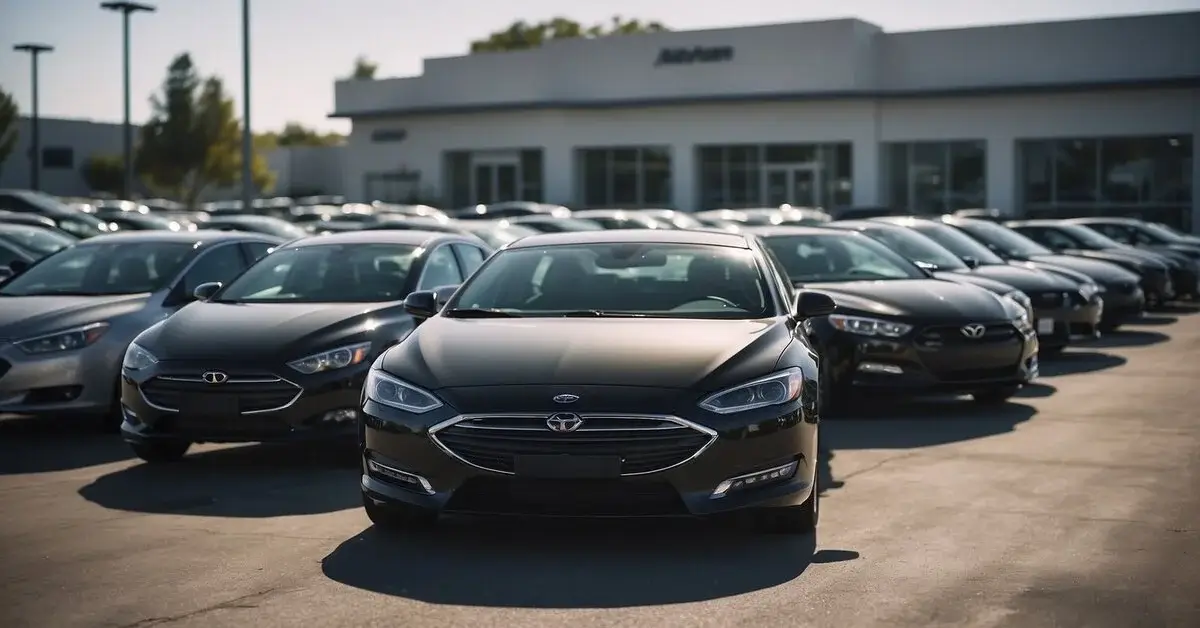In-house financing car dealerships streamline the car buying process by combining vehicle selection and loan acquisition in one place, making it ideal for those overwhelmed by traditional methods or facing credit issues. These dealerships provide a unique opportunity for buyers with varied credit histories, offering the chance to negotiate directly for potentially more flexible financing terms. While it’s crucial to be mindful of higher interest rates and understand all terms, in-house financing can offer a straightforward path to owning a car, especially for those working to improve their credit.
Understanding In-House Financing Car Dealerships
When I first heard about in-house financing car dealerships, it immediately caught my attention with its promise of convenience and speed. If you’re intrigued, let’s break down exactly what this means and how it can benefit you.
Defining In-House Financing
In-house financing is when the car dealership itself extends a loan to you, allowing you to finance the purchase of your vehicle directly with them instead of through an outside lender. By doing this, the dealership acts as both the seller and the financier, simplifying the buying process.
Key Points:
- Direct Financing: You work directly with the dealership for your loan.
- Convenience: Simplifies the process by integrating financing and purchasing.
Benefits of In-House Financing
One of the main advantages of in-house financing is the convenience it offers. Since financing is provided by the same place selling you the car, the process can be much faster and the paperwork less daunting. Additionally, in-house financing can be more accessible, especially if traditional lenders have denied you credit.
- Simplified Transactions: Obtaining a loan where you buy the car streamlines the transaction.
- Accessibility: Ideal for those with credit issues who still need a vehicle.
By choosing in-house financing, you could find yourself navigating the path to owning a new car with greater ease and perhaps less worry about your credit history. Not to mention, the speed at which you can potentially get approved and drive off the lot might surprise you.
Eligibility and Requirements
When considering in-house financing car dealerships, I find it’s crucial to understand the eligibility criteria and the necessary documentation you’ll need to provide. In-house financing could be a viable option for individuals with diverse credit backgrounds, including those with bad credit, or sometimes, even if they’ve not built credit at all.
Credit Considerations
Credit Score:
- In-house financing dealerships often cater to customers regardless of their credit score. This can be particularly beneficial if you’ve faced difficulty obtaining a loan from traditional lenders.
- “No credit check” policies may exist, which means that the dealer may not pull a report from major credit bureaus. However, some will still review your credit situation to determine financing terms.
Documentation and Paperwork
Required Paperwork:
- Completing a loan application form is a standard procedure and typically requires personal details and financial information.
- You can expect to provide proof of income, residence, and sometimes references to secure your loan, with specifics varying by dealership.
Documentation requirements are a pivotal step in the process and can influence the financing you receive. Being prepared with all the necessary paperwork can streamline the loan approval and vehicle purchasing experience at in-house financing car dealerships.
The Financing Process

When I approach in-house financing car dealerships, my main goal is to secure a car loan directly from the place where I’m purchasing the vehicle. This integrated approach often simplifies the buying process and makes coordinating the financial details more straightforward.
Selecting Your Vehicle
First, I browse the inventory to select the car that meets my needs and budget. In-house financing dealerships usually have a range of vehicles to choose from, which means I can find one that’s just right for me without having to go through third-party lenders.
Discussing Loan Terms
Once I’ve picked out a car, we’ll discuss the loan terms. This includes the down payment, the loan amount, and the interest rates which will affect my monthly payment. It’s important to me to negotiate terms that are fair and sustainable over the payment schedule.
Finalizing the Loan
After agreeing on the loan terms, it’s time to finalize the loan. We’ll go over all the details carefully, ensuring that the down payment, monthly payment, interest rates, and payment schedule are all clear and manageable for my financial situation. Then, I sign the paperwork to complete the purchase.
Pros and Cons of Dealer Financing

When I think of financing a car, in-house financing car dealerships often come to mind for their one-stop shopping experience. Let’s dive into what makes them appealing to some buyers and a bit less attractive to others.
Pros of In-House Financing
In-house financing can be a convenient option, providing a streamlined process where negotiation, paperwork, and financing all happen in one place. This is particularly helpful if you have poor credit; dealerships may be more flexible and willing to finance your purchase when traditional lenders, like banks and credit unions, might not approve your loan.
One major advantage is the potential to negotiate. When considering the pros of in-house financing dealerships, the opportunity to sit down and discuss rates directly can be less intimidating. It’s also beneficial for those who want to quickly drive off in their new vehicle without the back and forth that often accompanies outside financing sources.
- Convenient
- Negotiable terms
- Possibility for those with poor credit
Cons of In-House Financing
While convenience is significant, it’s crucial to weigh that against the high-interest rates often associated with dealer loans, especially with ‘buy here, pay here’ lots. These can make the total cost of ownership considerably higher than if you were to secure a loan through a bank or credit union. The ultimate guide to dealer financing suggests getting pre-approved before stepping into a dealership to have leverage during negotiations.
Another downside is the risk of a financial structure that doesn’t help you in the long run. You might be focused on monthly payments rather than the total loan cost, which can result in paying more over time.
- Higher interest rates
- Risk of unfavorable financial structures
- Total loan cost may be higher
Comparing Financing Options

When exploring in-house financing car dealerships, I find it helpful to understand how their offerings stack up against traditional bank loans and credit union financing. We’ll break down the key differences, including interest rates and terms, which may affect your decision.
In-House vs. Bank Financing
Banks: Offering loans that come with competitive interest rates, banks are a common choice for many buyers. The rates you receive from a bank often depend on your credit score. A higher credit score can secure you lower rates. However, securing a bank loan requires more paperwork and time.
In-House Financing: On the other hand, an in-house financing dealership may offer loans regardless of your credit history, often with quicker approval times. It’s quite convenient to get the loan directly where you’re purchasing the car. Nonetheless, the interest rates might be higher compared to banks, reflecting the higher risk the lender takes.
In-House vs. Credit Union Loans
Credit Unions: As member-only institutions, credit unions are known for their lower interest rates on loans versus traditional banks. Their approach to lending is often more personable, and they can work with you particularly if you’re a long-standing member.
In-house financing: With in-house financing, convenience is a strong point, as you’re able to negotiate your loan terms on the spot. They’re more likely to work with you if traditional third-party lenders have declined your loan application. However, similar to bank financing, in-house options may come with higher interest rates.
Choosing between in-house financing at car dealerships and obtaining a loan from a bank or credit union depends on your financial situation, credit score, and whether you value convenience or a potentially lower cost of borrowing. Each has its merits, and it’s about finding the balance that suits my needs the best.
Additional Considerations

When considering in-house financing car dealerships, I need to look beyond the immediate convenience they offer. I need to be aware of various factors that could impact my financial situation in the long run, such as interest rates, associated fees, and how my loan activity might affect my credit score.
Interest Rates and Fees
Buy-here, pay-here dealerships often charge higher interest rates compared to traditional auto loans. For me, this means the overall cost of the vehicle can be significantly higher in the long term. It’s crucial to scrutinize the loan terms for any additional fees or penalties that might strain my buyer’s budget if I’m not careful.
Understanding Buy Here, Pay Here
Choosing a buy-here, pay-here dealership requires me to carefully consider the conditions. These dealerships may provide a loan when traditional lenders won’t, but it’s essential to understand all the terms, including potential penalties for late payments, which could lead to my vehicle being repossessed more quickly than with a traditional lender.
Building Your Credit with an Auto Loan
An auto loan from an in-house financing car dealership can provide an opportunity to build your credit. I should make sure the dealership reports my loan activity to the major credit bureaus. Consistent, on-time payments may positively impact my credit score, making financial transactions easier for me in the future.
Frequently Asked Questions
What are the benefits of using in-house financing when purchasing a car?
In-house financing can offer more flexible approval criteria, which means I can still get a loan even if my credit history isn’t perfect. It also simplifies the car-buying process since I can select and finance the car in one location.
What is the difference between bank financing and in-house financing?
The difference lies mainly in the lender. When I use bank financing, I’m borrowing from a third-party financial institution, generally at set interest rates and terms based on my credit. In-house financing is offered directly by the dealership, which often allows for more flexible terms but possibly at higher interest rates.
How does in-house financing work?
With in-house financing, I apply for and secure my auto loan directly through the dealership where I purchase the car. The dealership acts as both the seller and the lender, which can streamline the process and potentially offer loans to those with less-than-ideal credit scores.
What is the difference between the buy rate and the sell rate?
The buy rate is the interest rate a financial institution charges the dealership. The sell rate, which is the rate I’m offered, is typically marked up from the buy rate as the dealership’s profit. Understanding this helps me negotiate better terms on my loan.
What are the typical requirements for in-house financing at a car dealership?
The typical requirements may include a minimum income level, a stable job history, a valid driver’s license, and proof of residency. Dealerships might also check my credit history, although in-house financing is often more lenient about credit scores compared to traditional lenders.
I hope you found some inspiration or useful tips in our article on in-house financing car dealerships! If so, I’d love to hear your thoughts and ideas in the comments below! And if you’re looking for more insightful content, don’t hesitate to explore our other articles:
- Best Colleges For Finance: Top 10 U.S. Institutions
- Graduation Money Bouquet: A Creative Gift Idea
- The 30/30/40 Rule 2024: 10 Best Tips to Start Budgeting
- 20/40/60 Rule: Simplifying Life Decisions
Your comments help us create better content for you. Happy reading!






